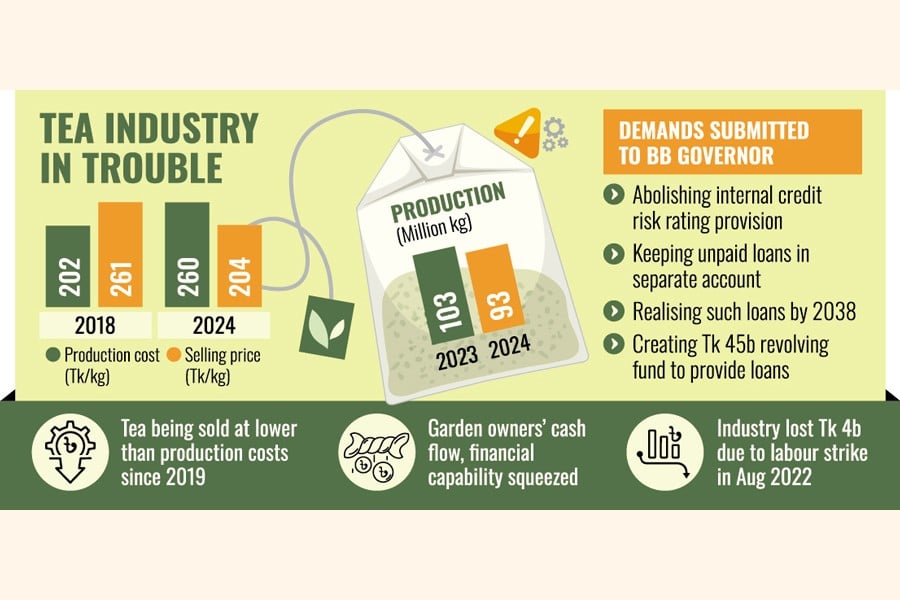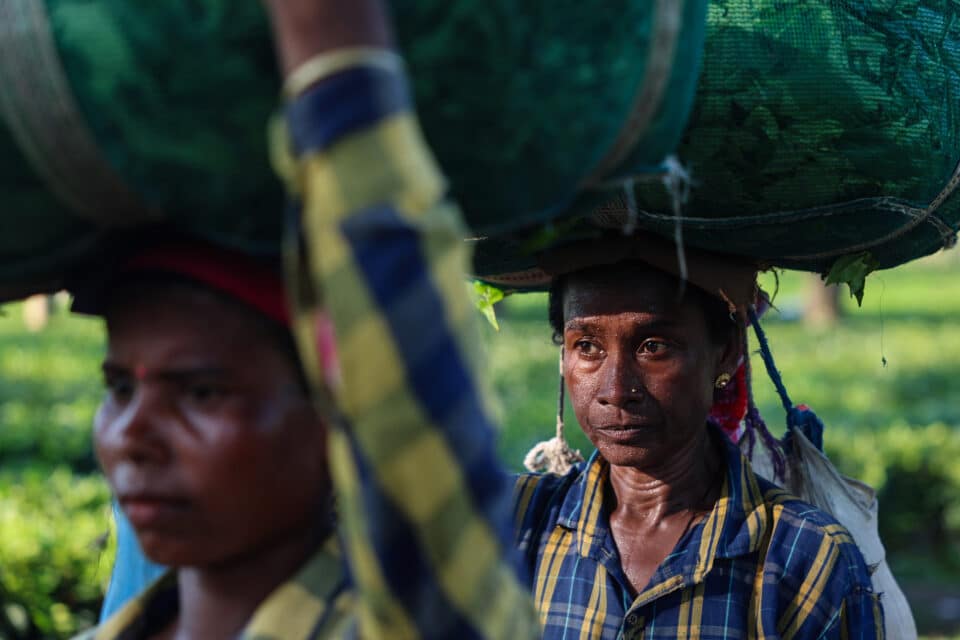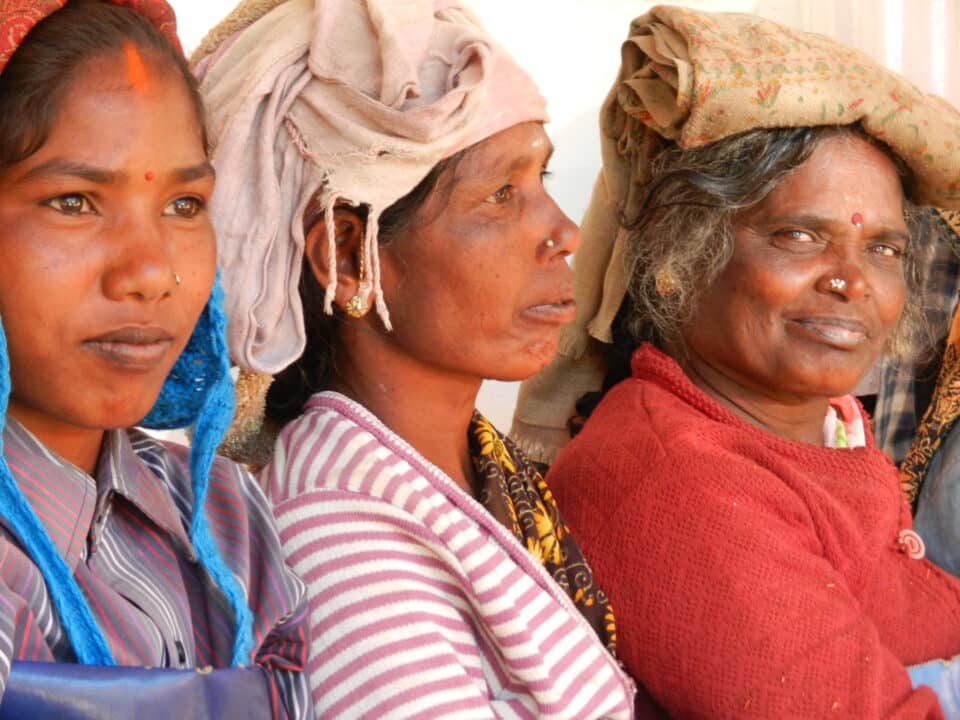The Headlines
As July’s headlines show, tea-growing regions are on the frontlines of climate change. In Assam, Sylhet and North Bengal, droughts, floods and heat are making harvests harder and life more precarious.
It’s not all bleak, from Sri Lanka to Kenya, producers are finding ways to adapt – trialling pest control methods, replanting with climate-resilient crops or using local resources to improve soil health. In Assam, Rainforest Alliance is backing new regenerative farming trials that could help cut pesticide use and restore balance to the land.
At the same time, too many tea workers, especially women and young people, remain unprotected. Stories from Bangladesh, Kenya and India show that exploitation, insecurity and hunger are daily realities, even as some communities push back with quiet but powerful forms of resistance. Where the climate hasn’t disrupted work, unpaid wages and poor conditions have, pushing workers to strike, demand overdue reforms or leave the industry. But a reopened estate here, a grassroots cooperative there, these are the glimmers of change worth watching.
The conversation is also shifting as producers in Nepal, India and Kenya call for new policies and fairer pricing, while here in the UK, we’re supporting Fairtrade’s push for a new law that would hold companies accountable for conditions in their global supply chains, and the Corporate Justice Coalition’s call for a UK Business Human Rights and Environment Act.
One of the most striking aspects of this month’s news is the fact that, despite all the challenges faced by the tea industry globally, in particular prices stagnating in light of the widely acknowledged oversupply of tea, governments, organisations and individuals are continuing to encourage farmers to plant more and more of it. Given all the hardships described in this News Update, it is deeply worrying to hear farmers who are being encouraged to switch to tea production saying “If tea works here, it could change our fortunes… We’ve seen how tea brought prosperity to regions in Himachal and Assam—maybe it’s our turn now.”
THIRST urges the industry and policy makers to work together, to ‘think globally’ before acting locally.
Climate extremes continue to hit the tea heartlands
Tea-producing regions are seeing the effects of climate change more clearly than ever. In Bangladesh, Sylhet recorded just 4mm of rain from January to March, down from 46mm the previous year, disrupting production and endangering over 100,000 workers (Observer Bangladesh, 04/07/2025). Similar conditions are affecting Assam, where June tea output dropped by up to 25% due to extended dry spells (Assam Tribune, 26/07/2025), while Tripura’s estates report falling yields linked to heat and labour shortages (Live Mint, 15/07/2025).
North Bengal is facing its own extremes as drought has scorched tea gardens and rice fields, while the south contends with floods (News Arena India, 17/07/2025). In Assam, severe flooding from the Balijan River submerged the Bhologuri estate, cutting off roads, food supplies and health access for workers (India Today NE, 02/07/2025). But also in Assam, in response to rising pest attacks, degraded soils and tighter rules on pesticides, a new Rainforest Alliance initiative backed by brands – the Integrated Pest Management (IPM) Taskforce – is helping producers reduce their reliance on chemicals and restore ecological balance. This approach could offer a viable path for sustainable tea across India and beyond. (Rainforest Alliance). Meanwhile, Japan’s matcha growers are battling rising global demand and record heat, which is pushing prices up and shrinking harvests (Reuters, 04/07/2025).
Tea communities are adapting through innovation
Amid rising challenges, producers are turning to innovation to stay afloat. In Sri Lanka, farmers are adopting Chinese-developed pest control techniques such as immune induction, aimed at improving yields while reducing pesticide use (Xinhua Net, 08/07/2025). Further east, Vietnamese grower Ms. Hai has developed a probiotic-rich fertiliser from bananas, eggs and soybeans, now used by hundreds to improve crop quality and reduce production costs (Vietnam, 20/07/2025).
New regions are also entering the sector. In Jammu & Kashmir, farmers are planting 20,000 tea saplings in Kathua as part of a state-backed push to diversify away from maize and wheat (Deccan Herald, 27/07/2025). In Kenya, adaptation is being driven through distribution of 400,000 climate-resilient tea plants to smallholders (Ecofin Agency, 21/07/2025), while others explore tea tourism as a sustainable source of local income (People Daily, 21/07/2025).
Pushing for better pay, better prices and stronger policies
As economic pressure mounts, workers are stepping up demands for fairness and accountability. In Bangladesh, protests erupted in Sylhet as workers called for a daily wage of Tk 600 and full food rations (Sylhet Today, 21/07/2025). Sreemangal saw renewed calls for land rights and political action (Sylhet Today, 30/06/2025).
Across the border in India, workers at Darjeeling’s Longview estate are still owed more than Rs 15 crore in provident fund contributions, some waiting years without resolution (Scroll, 15/07/2025). In Assam, workers at Duflating estate held protests over wage delays and exploitation (Pratidin Time, 21/07/2025). In Sri Lanka, unions secured a court ruling halting the conversion of permanent workers into contract labourers, although appeals are ongoing and workers continue to demand stronger protections (Green Left, 24/07/2025).
Market uncertainty is driving renewed calls for reform. In India, the Confederation of Indian Small Tea Growers Associations (CISTA) want a pricing model based on the final value of tea sold, arguing that current auction systems do not reflect their contribution (Business Standard, 10/07/2025). Specifically, in the Nilgiris, 1,000 growers staged protests over Rs 1.4 crore in unpaid arrears and demanded a Rs 40 support price for green leaf (The Hindu, 17/07/2025).
Governments are responding in some areas; India’s Provident Fund authority is launching inspections across Darjeeling and Terai following reports of unpaid worker contributions (Telegraph India, 25/07/2025). In Assam, officials are enrolling 50,000 previously unregistered tea workers into Aadhaar, aiming to connect them with welfare schemes while addressing border security concerns (Devdiscourse, 29/06/2025).
In Nepal, producers are calling for a new tea law and dedicated tea board to support export growth and quality control (Rising Nepal Daily, 06/07/2025). In Kenya, the Tea Board is urging pan-African regulatory cooperation to boost the global position of African premium teas (KBC, 18/07/2025).
Meanwhie, the Fairtrade Foundation is calling for a UK law on human rights and environmental due diligence; collaborative, multistakeholder reform that includes everyone in the supply chain; and delivery on climate finance promises to empower resilience. You can sign the petition here: action.fairtrade.org.uk. The call echoes a lobby by the Corporate Justice Coalition for a Business Human Rights and Environment Act covering all UK businesses with global supply chains (CJC).
Women and children’s voices and safety in tea remain at risk
Women continue to bear a disproportionate burden in the tea sector. In Kenya, a new report – An Analysis of Women Workers’ Experiences of Rights Violations in Kenya’s Tea Sector-by the Coalition Against Sexual Violence (available on THIRST’s Knowledge Hub) has shed light on widespread abuse and exploitation, which highlights the gap between legal protections and lived reality on tea estates (The Standard, 01/07/2025; Daily Nation, 12/07/2025). Issues of unsafe conditions, low wages and harassment remain widespread, especially among casual workers.
Yet efforts to improve inclusion are emerging. In Assam, non-working women are gaining access to bank accounts and state benefits for the first time, helping families build resilience during lean periods (UNICEF, 01/07/2025). In China, women are taking the lead in cultural preservation, particularly in Anxi County, where thousands are being trained in traditional Tieguanyin processing methods through a locally led institute (Women of China, 21/07/2025).
Children and young people in tea-growing regions face mounting pressure. In Bangladesh’s Habiganj district, nearly 30% of children in tea communities are working, girls are especially vulnerable and forced to drop out of school due to hunger, gender norms and family debt (Sylhet Today, 07/07/2025).
In India’s Assam region, economic stress is driving youth to migrate out of tea estates in search of work. Many are recruited through unregulated labour brokers with little protection or oversight. Some are never heard from again (Assam Tribune, 15/07/2025).
Closures and community action mark a changing industry
The fragility of estate-based models is becoming more apparent. In North Bengal, Ambari Tea Garden closed without notice and left over 1,000 workers without pay or recourse (Millennium Post, 08/07/2025). However, some stories offer a glimmer of resilience. Ambootia Tea Estate in Kurseong reopened after 22 months of closure with workers cautiously returning (Millennium Post, 21/07/2025).
A new documentary from India’s Northeast revisits the story of Sonali Tea Garden, which closed in 1973. Its workers formed a cooperative and took control of operations, decades before equal pay legislation or widespread unionisation. The film explores how community action can provide sustainable alternatives when estates collapse (ANS, 10/06/2025).
Increasing tea production adds to global overssupply
Despite a global oversupply of tea that is driving down prices, several countries and regions are actively promoting tea cultivation—risking further worsening the imbalance. In Indonesia, once a leading exporter, outdated farming and low profitability have shrunk output, yet government programs are revitalising plantations, replanting 3,200 hectares in West Java. (Saibumi, 7/7/2025) In Georgia’s Guria region, entrepreneurs have restored abandoned Soviet-era fields to supply local and European markets. (Reuters, 18/7/25) And in India’s Jammu and Kashmir, a major plantation drive is introducing tea to hilly areas traditionally reliant on maize and wheat. (Deccan Herald, 27/7/25).
These initiatives, while boosting local economies, add to the already saturated global market. Given all the hardships described above, it is deeply worrying to hear farmers who are being encouraged to switch to tea production saying “If tea works here, it could change our fortunes… We’ve seen how tea brought prosperity to regions in Himachal and Assam—maybe it’s our turn now.”
Share this update
Sign up for our monthly newsletter to stay in the know about human rights in the tea sector
Each issue of our newsletter includes:
A summary of the latest tea sector news
Upcoming THIRST events
THIRST news and updates
New reports and resources from our Knowledge Hub




